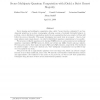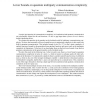62 search results - page 6 / 13 » Classical Knowledge for Quantum Security |
116
click to vote
FOCS
2006
IEEE
15 years 8 months ago
2006
IEEE
Secret sharing and multiparty computation (also called “secure function evaluation”) are fundamental primitives in modern cryptography, allowing a group of mutually distrustfu...
142
click to vote
ICQNM
2008
IEEE
15 years 8 months ago
2008
IEEE
Coin flipping is a cryptographic primitive in which two spatially separated players, who in principle do not trust each other, wish to establish a common random bit. If we limit ...
145
click to vote
COCO
2009
Springer
15 years 8 months ago
2009
Springer
A major open question in communication complexity is if randomized and quantum communication are polynomially related for all total functions. So far, no gap larger than a power o...
117
click to vote
CORR
2007
Springer
15 years 1 months ago
2007
Springer
We give a new, simulation-based, definition for security in the bounded-quantum-storage model, and show that this definition allows for sequential composition of protocols. Damg�...
123
click to vote
QUANTUMCOMM
2009
Springer
15 years 8 months ago
2009
Springer
Quantum key distribution (QKD) promises secure key agreement by using quantum mechanical systems. We argue that QKD will be an important part of future cryptographic infrastructur...


